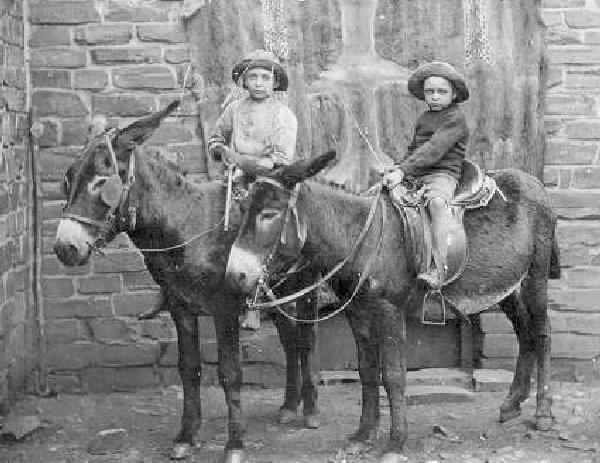 Figure 1.--These two Boer boys were photographed during the Boer War. The Boers were a largely agricultural people. Most boys learned to ride at an early age and most boys were excellent horsemen. The Boer calvalry plasyed a major role in the War. |

|
The Boer War was fought entirely in southern Africa. As a result it was mostly Boer children that were affected by the War. The British Army at the time still accepted boys. It was, however, primarily the Boer children that were affected. Many children were orphaned. Many boys enlisted in the military and were either killed or captured by the British. The Boers boys that fought were the Penkops. The British confined many Boer families, including the children, in concentration camps. There because of deplorable conditions, many died as a result of malnutrition and disease.
The British Army at the time still accepted boys. It was, however, primarily the Boer children that were affected. Many children were orphaned. Many boys enlisted in the military and were either killed or captured by the British. The Boers boys that fought were the Penkops.
The British Army at the time still accepted boys. We do not have much informtion on this yet such as the ages at which boys could enlist. Some of the boys came from afew military schools run rather like orphanages in the 19th century. The boys accepted in the army commonly served as mussicians at first, such as drummer boys. We would like to add more information and would be interested in any informtion readers may be able to offer.
There were Boer child soldiers who fought the British during the Boer War. There were known as the Penkops. Many of the boys were captured by the British during the War. They were transported to prisonor of war (POW) camps in various British colonies, some very isolated places. They included Bermuda, Ceylon (Sri Lanka), India, and St. Helena. St. Helena is an isolated island in the South Atlantic, better known for wher the British sent Napoleon after Waterloo. The boys were treated just like other Boer POWs, without any deference to their age. Their treatment varied somewhat from place to place. Penkops boy prisionors on Bermuda were separated from the Boer men POWs. The boys were sent to a facility on Darrell's island. There thge British decided to teach them to be loyal sunjects of the Queen. They were required to attend school which was taught in English. The boys mostly only spoke only Afrikaans. They were forbidden to express any patriotic sentiments toward the Boers, including singing patriotic songs. Many of the boys resisted the British regime, some defiantly singing the Boer national anthemn. For these and other acts of disobiedence, the boys were severely beaten. Large numbers of Boer children died in the British concentration camps in South Africa. We are not sure about how many of these Penkops boys died in British custody. Today in South Africa their is a youth group called the Penkops.
It was, however, primarily the Boer children that were affected. Many children were orphaned. Many boys enlisted in the military and were either killed or captured by the British. We notice one orphaange for the children--the Breda Street Orphanage.
The British in an effort to stop Boer civiliand from aiding guerilla, established concentration camps. The term "concentration camp" has become almost synonamous with the German NAZIs. It was the British during the Boer War who coined the term. This was the first use of the term and occurred at the very onset of the 20th century. To combat Boer guerillas, the British burned Boer farms and homes and forced the women, childen and elderly they found into poorly prepared concentration camps. The horrors of the camps have been graphically recounted. One author repots more than 20,000 died in the camos--mostly children. [Wilson] Another rport estimates the death of 25,000 Boer civilians (mostly women and children) and 14,000 natives. It was mismanagement of the camps that resulted in the deaths, not intentional genocide. While the numbers pale in comparison to later 20th century camps, they were a shock to 20th century sebsibilities and was an enormous loss to the relatively small Boer population. The Boer comandos were starved into submission. Many women and children in the camps starved or died from disease. The War finally ended with the Treaty of Vereeniging (May 1902).
Wilson, A.N. The Victorians (Norton), 724p.
Navigate the Children in History Website:
[Return to Main Boer war page]
[Return to Main military style page]
[About Us]
[Introduction][Biographies][Chronology][Climatology][Clothing][Disease and Health][Economics][Freedom][Geography][History][Human Nature][Ideology][Law]
[Nationalism][Presidents][Religion][Royalty][Science][Social Class]
[Bibliographies][Contributions][FAQs][Glossaries][Images][Links][Registration][Tools]
[Children in History Home]
